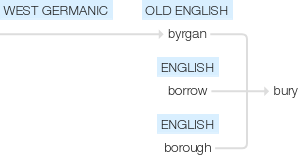Bury
Old English byrgan, of West Germanic origin; related to the verb borrow and to borough.
wiktionary
Middle English burien, berien, from Old English byrġan, from Proto-Germanic *burgijaną(“to keep safe”), ultimately from Proto-Indo-European *bʰergʰ-(“to defend, protect”). Cognate with Icelandic byrgja(“to cover, shut; to hold in”); West Frisian bergje(“to keep”), German bergen(“to save/rescue something”); also Albanian mburojë(“shield”), Eastern Lithuanian bir̃ginti(“to save, spare”), Russian бере́чь(beréčʹ, “to spare”), Ossetian ӕмбӕрзын(æmbærzyn, “to cover”).
The spelling with ⟨u⟩ represents the pronunciation of the West Midland and Southern dialects, while the Modern English pronunciation with /ɛ/ is from the Kentish dialects. [1]
See borough.
etymonline
bury (v.)
Old English byrgan "to raise a mound, hide, enclose in a grave or tomb, inter," akin to beorgan "to shelter," from Proto-Germanic *burzjan- "protection, shelter" (source also of Old Saxon bergan, Dutch bergen, Old Norse bjarga, Swedish berga, Old High German bergan "protect, shelter, conceal," German bergen, Gothic bairgan "to save, preserve"), from PIE root *bhergh- (1) "to hide, protect." Meaning "cover, conceal from sight" is from 1711. Related: Buried; burying. Burying-ground "cemetery" attested from 1711. Buried treasure is from 1801.
The Old English -y- was a short "oo" sound, like modern French -u-. Under normal circumstances it transformed into Modern English -i- (in bridge, kiss, listen, sister, etc.), but in bury and a few other words ( merry, knell) it retained a Kentish change to "e" that took place in the late Old English period. In the West Midlands, meanwhile, the Old English -y- sound persisted, slightly modified over time, giving the standard modern pronunciation of blush, much, church.
